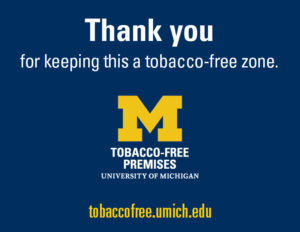The Tobacco-Free University Premises policy assumes that all employees will be apprised at hire of the rules and consequences for violations, and will be reminded of them as the need arises. Supervisors are expected to ensure the policy is known and followed.
Talking Tips
- If you find people or are notified of people using tobacco on campus grounds, respectfully ask whether they are aware of our Tobacco-Free University Premises policy.
This policy means there is no tobacco use except on sidewalks along major thoroughfares and in personal vehicles. This policy is important to the health and well-being of all our employees, visitors and students. - The person may ask where he or she can use tobacco.
Please direct them to the nearest sidewalk along a major street and explain that tobacco use is allowed on sidewalks that border major streets. Using tobacco inside a personal vehicle is not prohibited, per the policy. - Offer assistance/support. Make sure people are aware of the MHealthy Tobacco Consultation Service (TCS) and how it can assist.
If appropriate, offer information about campus resources available to help them quit. The TCS offers free tobacco cessation counseling, and can be reached at (734) 998-6222 or quitsmoking@med.umich.edu.
Frequently Asked Questions
Q: What is the Tobacco-Free University Premises policy?
A: The policy is an update to the university’s 2011 Smoke-Free University Campuses policy. The update prohibits the use of additional tobacco products called electronic nicotine delivery systems (ENDS), such as vapes, vape pens, hookah pens, e-cigarettes, e-cigars and other vape devices, as well as smokeless tobacco products, often called dip, chew, snuff and snus, in university spaces.
In short, it means all tobacco products are prohibited in buildings and exterior grounds owned or operated by U-M, as well as in university-owned vehicles.
Q: Who does the policy affect?
A: It applies to students, faculty, staff, retirees, contractors, visitors, volunteers, service representatives and all others in university buildings and on exterior grounds.
Q: Why was the policy updated?
A: U-M’s goal is to create healthy spaces for all who visit, work, or live on our campuses. The significant health risks caused by vaping, vape-like devices and smokeless tobacco products have been verified both in academia and in real-world clinical practice.
Q: Is the university requiring that people on U-M campuses stop using tobacco?
A: No. The use of tobacco products is being prohibited on university premises. Although U-M will support those who wish to stop using tobacco with free cessation and treatment programs, tobacco use will be permitted on public sidewalks that border public thoroughfares, and within personal vehicles.
Q: Are there any exceptions?
A: The policy allows exceptions for research and cultural functions, such as smudging, with appropriate approval to ensure awareness and safety. See U-M’s Smudging Safety Policy for details.
Q: What services are available to faculty and staff who wish to decrease or stop using tobacco?
A: The MHealthy Tobacco Consultation Service provides free programs that focus on the most successful methods of ending tobacco addiction. Nicotine replacement therapy as part of these cessation programs also is available at no cost to members of U-M health plans.
Q: Where can students receive assistance in decreasing or stopping tobacco use?
A: Wolverine Wellness, a targeted coaching program for students interested in quitting tobacco, is offered through University Health Service. Behavioral counseling and support are free, including over-the-counter nicotine replacement products, as long as the student continues to participate in the program. View “Vaping, e-Cigarette and Tobacco Cessation Help to get started.
Q: Cessation programs may include nicotine replacement therapy. I thought tobacco/nicotine was prohibited on U-M campuses?
A: When prescribed as treatment in university-sanctioned cessation programs, nicotine replacement therapy, including patches, gum, spray, inhalers and lozenges, may be used on U-M campuses.
Q: What if people do not abide by the policy?
A: Our experience from the 2011 implementation of the smoke-free campus policy shows that the policy was largely respected, and we expect compliance will happen naturally. However, employees who habitually disregard the policy will receive counsel from their supervisors in the same way other university policies are enforced. Repeated student violations will be directed to the Office of Student Conflict Resolution.
Q: How Have U-M’s Tobacco Policies Evolved?
A: U-M in 1987 instituted a university-wide ban on smoking in buildings (except designated residence halls) and university vehicles. In 1998, the Health System, now Michigan Medicine, prohibited smoking on the grounds and in public spaces. In 2003, the Residence Hall Association eliminated smoking from residence halls. And in 2011, the university implemented the Smoke-Free University Campuses policy.
Q: Where can I get more information?
A: View tobaccofree.umich.edu for more information about the Tobacco-Free University Premises Policy, resources to assist with tobacco addiction, tips for those trying to kick the habit in the workplace, and more.
Printable Tobacco-Free Premises Signage:

